
Marie Antoinette was the last queen of France before the French Revolution. She was born an archduchess of Austria and was the penultimate child and youngest daughter of Empress Maria Theresa and Emperor Francis I. She became dauphine of France in May 1770 at age 14 upon her marriage to Louis-Auguste, heir apparent to the French throne. On 10 May 1774, her husband ascended the throne as Louis XVI and she became queen.

Louis XVI was the last king of France before the fall of the monarchy during the French Revolution. He was referred to as Citizen Louis Capet during the four months just before he was executed by guillotine. In 1765, upon the death of his father, Louis, Dauphin of France, he became the new Dauphin. Upon his grandfather Louis XV's death on 10 May 1774, he assumed the title King of France and Navarre, until 4 September 1791, when he received the title of King of the French until the monarchy was abolished on 21 September 1792.

Stefan Zweig was an Austrian novelist, playwright, journalist and biographer. At the height of his literary career, in the 1920s and 1930s, he was one of the most widely translated and most popular writers in the world.

Joseph Schildkraut was an Austrian-American actor. He won an Oscar for his performance as Captain Alfred Dreyfus in the film The Life of Emile Zola (1937); later, he was nominated for a Golden Globe for his performance as Otto Frank in the film The Diary of Anne Frank (1959) and a Primetime Emmy for his performance as Rabbi Gottlieb in a 1962 episode of the television series Sam Benedict.

Marie Antoinette is a 1938 American historical drama film produced by Metro-Goldwyn-Mayer. It was directed by W. S. Van Dyke and starred Norma Shearer as Marie Antoinette. Based upon the 1932 biography of the ill-fated Queen of France by the Austrian writer Stefan Zweig, it had its Los Angeles premiere at the legendary Carthay Circle Theatre, where the landscaping was specially decorated for the event.
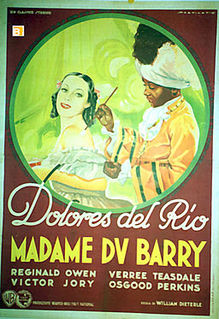
Madame DuBarry is a 1934 American historical film directed by William Dieterle and starring Dolores del Río, Reginald Owen, Victor Jory and Osgood Perkins. The film portrays the life of Madame Du Barry, the last mistress of King Louis XV of France. While this film does not serve accuracy to Madame Du Barry, it does feature antiques and jewelry that came from the actual days when Madame Du Barry lived. This film was released just as the Hollywood Production Code was taking full swing, and faced many problems with censors of the time. Scenes of this film had to be removed before its release or else it would have not been approved for release.

Florimond Claude, comte de Mercy-Argenteau was an Austrian diplomat.
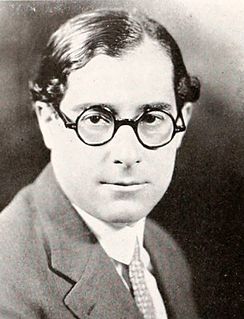
Ernest Vajda was a Hungarian actor, playwright, and novelist, but is more famous today for his screenplays.

Marie Antoinette is a 2006 historical drama film written and directed by Sofia Coppola and starring Kirsten Dunst. It is based on the life of Queen Marie Antoinette in the years leading up to the French Revolution. It won the Academy Award for Best Costume Design. It was released in the United States on October 20, 2006, by Columbia Pictures.
Marie Antoinette (1755–1793) was an Archduchess of Austria and the Queen of France.

Archduke Karl Salvator of Austria, in Italian Carlo Salvatore Maria Giuseppe Giovanni Battista Filippo Jacopo Gennaro Lodovico Gonzaga Raniero, in German Karl Salvator Maria Joseph Johann Baptist Philipp Jakob Januarius Ludwig Gonzaga Ranier, was a member of the Tuscan branch of the House of Habsburg.

Magdalena Schneider was a German actress and singer. She was the mother of the actress Romy Schneider.
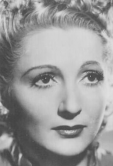
Annie Ducaux was a French actress, who appeared in 40 film and television productions between 1932 and 1980. Ducaux was a shareholder in the state theater Comédie-Française from 1948, and played in numerous stage productions there. She is possibly best-remembered for her roles in such films as Abel Gance's Beethoven's Great Love (1937), Conflict and Les grandes familles.

Rudolf Hans Bartsch (born 11 February 1873 in Graz, Styria – died 7 February 1952 in St. Peter in Graz), was an Austrian military officer, and writer. He was nominated for the Nobel Prize in Literature six times.
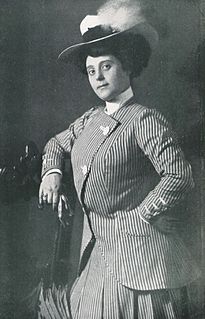
Olga Limburg was a German theater and film actress. She began her artistic career in 1901 with a commitment at the Municipal Theatre of Poznan. Since 1902, she played at several of Berlin's leading theaters including the Tribune, the Metropol Theatre, Berlin Lustspielhaus, the comedy and the Theater am Kurfürstendamm. During the early part of her theater career, Limburg usually played supporting roles. Later she worked in the "comical oldies" plays.
Rudolf Meinert (1882–1945) was an Austrian screenwriter, film producer and director.
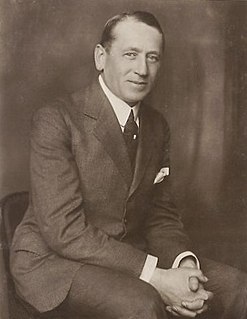
Eugen Burg was a German actor. His daughter was Hansi Burg. Burg was a close friend of the actor Hans Albers.

Walter Walker was an American actor of the stage and screen during the first half of the twentieth century. Born in New York City on March 13, 1864, Walker would have a career in theater prior to entering the film industry. By 1915 he was appearing in Broadway productions, his first being Sinners, written by Pulitzer Prize-winning playwright, Owen Davis. His film debut was in a leading role in 1917's American – That's All. He had a lengthy career, in both film and on stage, appearing in numerous plays and over 80 films. Walker died on December 4, 1947 in Honolulu, Hawaii.
Claudine West (1890–1943) was a British novelist and screenwriter. She moved to Hollywood in 1929, and was employed by MGM on many films, including some of their biggest productions of the late 1930s and early 1940s. Many of the films she worked on were British-themed such as Goodbye, Mr. Chips and The White Cliffs of Dover.
Heinz Goldberg (1891–1969) was a German screenwriter. He also directed two silent films. Following the Nazi Party's rise to power in 1933, the Jewish Goldberg went into exile in several countries including Austria and the Soviet Union before settling in Britain. He returned to Germany in the 1950s.
















